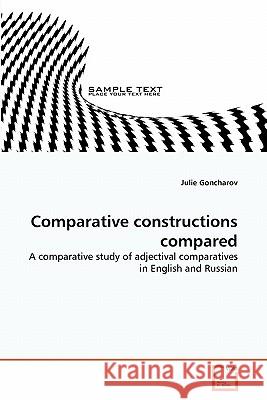Comparative constructions compared » książka
Comparative constructions compared
ISBN-13: 9783639284294 / Angielski / Miękka / 2011 / 100 str.
Comparative constructions have been the focus of much research in generative grammar. The puzzles they give rise to have been extensively studied both from syntactic and semantic points of view. These studies have triggered signi cant development in the theory of phrasal and clausal architecture and shed light on some important mechanisms such as quanti cation, wh-movement and ellipsis. The study presented in this book investigates adjectival comparative constructions in Russian. The novel idea advanced in this book is that the word 'chem' that introduces comparative clauses in Russian is a modifier of an obligatory Dimension-argument. The presence of this argument explains some puzzling phenomena in Russian such as the impossibility of Subdeletion comparative constructions. This mechanism is shown to be an instance of non-canonical quantification and to advance our understanding of the adjectival degree modification. This study is of interest to scholars concerned with syntax and semantics of gradable predicates and degree modification as well as to those engaged in a research in Slavic linguistics."
Comparative constructions have been the focus of much research in generative grammar. The puzzles they give rise to have been extensively studied both from syntactic and semantic points of view. These studies have triggered significant development in the theory of phrasal and clausal architecture and shed light on some important mechanisms such as quantification, wh-movement and ellipsis. The study presented in this book investigates adjectival comparative constructions in Russian. The novel idea advanced in this book is that the word chem that introduces comparative clauses in Russian is a modifier of an obligatory Dimension-argument. The presence of this argument explains some puzzling phenomena in Russian such as the impossibility of Subdeletion comparative constructions. This mechanism is shown to be an instance of non-canonical quantification and to advance our understanding of the adjectival degree modification. This study is of interest to scholars concerned with syntax and semantics of gradable predicates and degree modification as well as to those engaged in a research in Slavic linguistics.











